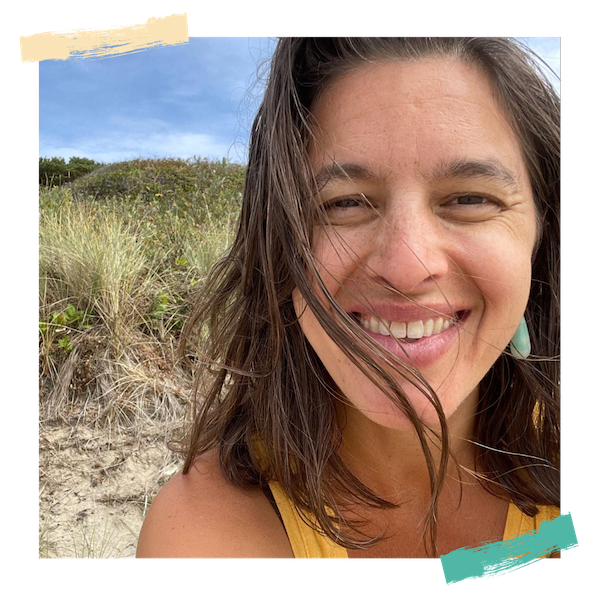Whenever Milly is being particularly 3 years old, I have a familiar story running through my head:
“Why does my child hate me? Why does she love everyone more than me? Why is she perfectly behaved and sweet as sugar when she’s around other people but a miniature tyrant possessed by a demon when she’s at home?”
I am a logical person by nature, so some part of my brain realizes this narrative is not true. It’s something I’ve constructed to explain my threenager. My heart, on the other hand, is less reasonable and is wounded easily. Especially when targeted by my hormonally–driven child.
Sometimes my stories are rewritten. One day my mom was watching Milly for the afternoon. When she dropped Milly off, she told me a different story about my daughter. One that truly surprised me.
That morning, I was trying to get Archer to fall asleep in the Moby, but he wasn’t having it, so I started to sing “Somewhere Over the Rainbow.” This has worked before for both kids. It’s a lullabye I’ve sung to Milly since she was a baby, too, so naturally, she started singing along. Nathan recorded it and we sent the video to my parents. Later, while my mom was playing with Milly she showed her the video and Milly started to cry, “I miss my family. I love my mommy. I want to go home.”
Everytime my mom tried to watch the video, she’d repeat the same thing over and over.
Never again will I tell the tale of my demon child who doesn’t love me. I’ll just repeat the narrative of “she’s 3 years old, full of hormones, and excited to use them.”
This storytelling isn’t unique to me. We all have stories we tell ourselves that are not 100% true but perhaps based on emotional responses to things we experience in our every day lives.
Here are a few more of my “best selling” Naomi stories:
1. If you’re not with me, you’re against me.
This is one I’ve told myself for a long time. When I was I high school and college, I used it to explain why some people didn’t want to hang out with me. I assumed they didn’t like me. So in response, I actively didn’t like them back. It was very silly and often cost me what could have been a good friendship.
As an adult, this story has reared its head in friendships, but also in my yoga classes. If a student stopped coming to my class, I’d just assume she didn’t like me and I’d immediately write the student off. Good riddance. Hope you like your new yoga teacher better. I’m sure she’s better at everything.
Sigh…some habits die hard. I’ve learned that my story doesn’t usually match up with my former students story. But I still feel it from time to time.
2. Being in business is like the Hunger Games. Only one person can survive.
This is the story I tell myself about how everyone who offers what I offer is a threat to my success.
This means every yoga teacher and every health coach is direct competition to me. It doesn’t matter if they are teaching in my city or teaching internationally. If they’re teaching yoga or offering health coaching programs, especially to moms, that teacher or coach is a threat to my business.
Let me rephrase in a way that is more real: I feel threatened by them.
The truth is that while there are a lot of yoga teachers out there and lots of coaches, too, there are also a lot of students. People need yoga. They need coaching or support. They want to be healthy. What makes one person drawn to me but another person drawn to a different teacher or coach is not threatening. It’s simply a preference. What becomes essential is to be authentic and offer what I do so that the right people find me on the mat or in my coaching programs.
This one is tough for me. I’ve been working on it a long time. I’ve made a lot of headway, but it’s also tied into the next one which means overcoming not one, but 2 stories.
3. I am not good enough.
This is a nasty one. I’m not even sure how long I’ve been telling myself this story. The feeling of unworthiness and it’s many different stories have followed me around for too long.
This is not a feeling or a story I want my daughter to share. I want her to feel like she is enough because she is.
Here’s the catch, though. If my daughter is good enough, why wouldn’t I be good enough? We’re all ENOUGH for what we need.
If this is a story you tell yourself frequently, try saying this mantra during mediation: “I am enough.” Breathe it in; breathe it out. “I am enough.”
4. I am a bad mom.
I tell myself this story when I make my daughter cry. Or when she won’t do what I say. Or when she refuses to eat the food I make. Or when I lose my patience with her. Or when I am rougher with her than is necessary. Or when I yell at her. Or when I sit her in front of the TV for a few hours so I can get some work done/have some peace.
Sometimes it sounds more like, “I wish I was more like (fill-in-the-blank perfect mom). Her kids are angels. They eat everything she puts in front of them without a fight. She takes them to soccer and dance class and teaches them to sew and takes them on long walks through the woods and never yells and loves everything about being a mom. She never wishes she could run away from it all.”
I’m not sure this mom actually exists. Maybe she does. Even if this “perfect mom” exists, I’m not sure I really do want to be just like her.
I do love my kids, but some days I don’t love being a mom. This doesn’t make me a bad mom; it makes me human.
It also doesn’t mean the BAD MOM story isn’t persistent.
Here’s what I’ve learned about these stories: you can rewrite them whenever you want. Why? Because they exist in your head, not in real life.
Much like an unhealthy habit, you have the power to change the narrative you tell yourself.
I’ve done a lot of work with habits over the past few years. The power to create personal transformation is something that not only inspires me but motivates me. Habit change is at the foundation of the work I do in my coaching programs because the ability to redirect an old habit and create a new pattern that is healthier is a powerful skill.
Deeply entrenched habits can be tough to change. Often in order to change a habit, you have to rewire the way you think.
For example, if you want to learn how to go to bed earlier so you will feel less exhausted during the day but you consider yourself to be a “night owl”, you might have to reconsider how you define yourself. You’re not a night owl; you’re a person who likes to feel deeply rested and full of energy.
2 different stories with 2 different outcomes for the same person.
What are the stories you regularly tell yourself? How true are they? How much power do they have over you and your identity?
Are you ready to tell yourself a new one and rewrite how you define yourself?
I know I am.



